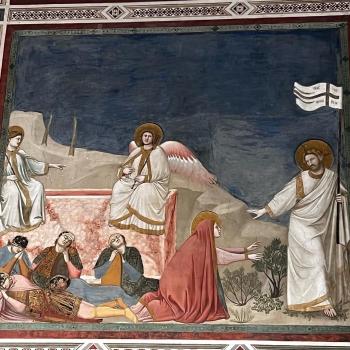 Rahab of Jericho is famously infamous for her occupation. How did a madam journey from the doomed walls of a pagan city to the sanctified tents of Israel’s leading family? One part drama, another part adventure, Rahab’s resurrection has much to teach us today.
Rahab of Jericho is famously infamous for her occupation. How did a madam journey from the doomed walls of a pagan city to the sanctified tents of Israel’s leading family? One part drama, another part adventure, Rahab’s resurrection has much to teach us today.
Setting the Stage
After the sons of Jacob settled in Egypt with their lost-now-found, right-hand-to-Pharoah brother, Joseph (Genesis 48–50), their descendants multiplied and flourished. When the book of Exodus opens, however, “a new Pharoah arose who did not know Joseph”—and who enslaved the Israelite people for fear that the burgeoning nation would threaten his rule. Four hundred years of oppression followed until finally God used Moses to lead his children out of Egypt.
They traveled to Sinai, where God gave them his Law, then up to the Jordan River. But, offered a chance to invade the Promised Land, Israel demurred out of fear. Because they retreated, God sentenced that generation to die in the wilderness over the course of forty years. We read about those wandering years in the Old Testament books of Exodus, Leviticus, Numbers, and Deuteronomy.
So as the book of Joshua opens, the next generation is grown up and ready to march into Canaan, the land God had promised their forefathers. Joshua, Moses’s successor, sends two spies to scope it out (Joshua 2), especially Jericho, the first major fortification in their path. How do they begin? By going to the house of prostitution situated in the outer wall of the city (Josh 2:1). The first thing that happens? They get caught. The king hears of their presence and sends word to Rahab to give them up (v 2).
Not a promising start to Israel’s invasion.

Rahab to the Rescue
Instead of obeying her king, Rahab hides the spies and deceives the searchers. She then secures a promise from the spies that, in return for her kindness to them, she and her family will be spared in the imminent battle (2:8–14). She then lets the spies escape through her window, which was in Jericho’s outer wall.
Joshua 6:25 later records that Joshua and the Israelites saved Rahab and her entire family because she had hid the spies, “and she lives among the Israelites to this day.”
Surprises in the Text
- The author sets our expectations, then inverts them.
The heroes of this story are supposed to be the spies. They are all that is honorable: God’s chosen people, male, warriors. Rahab is none of those things: she’s a pagan Canaanite, a woman, and an immoral woman at that.
But from the first sentence, our expectations are flipped. The spies come from Shittim (shuh-teem), a town with a dark history for Israel: in Numbers 25 we read how the men of Israel consorted with Moabite women and worshipped Baal, resulting in a plague that killed 24,000. Shittim recalled a shameful moment in their recent history, so the mention of that town would evoke at least a wince from original readers.
Next, the spies go from Shittim (cringe) to a prostitute’s house (big cringe). We are meant to squint in skepticism here. The author does not outright accuse them of misbehavior, but innuendo permeates his language: “So they went and entered the house of a prostitute named Rahab and stayed there” (2:1).
“Entered”: the verb has a blatant allusion to sexual activity.
“Lodge” or “Stay” in her house: This term in Hebrew has a double meaning, sort of like “sleeping with” a teddy bear or the boss. It can be innocent, or not.
Rahab means “broad”—slang for a potentially loose woman.
Taken together, these three words are meant to make our eyebrows rise in skepticism. If we saw it in a text, the sentence would end with the side-eye emoji.
2. This is Insider/Outsider language.
The spies were the ultimate insiders, faithful covenant men. OR WERE THEY? Rahab was the ultimate outsider, an immoral pagan woman. OR WAS SHE?
Part of Israel’s calling involved shining the light of Yahweh, his goodness and holiness, to the peoples around them. God wanted all people to live within his covenant, and Israel should have been welcoming outsiders and teaching them how to live as “insiders.” But the spies were acting more like outsiders, and Rahab acted more like a covenant loyalist.
In the verses that follow, she lies to her own king, misdirects his soldiers to a goose chase in the hills (“They went that way!”), and protected the enemy. Why did she turn traitor?
Rahab’s Astonishing Declaration
I know that Yahweh has given you this land and that a great fear of you has fallen on us . . . We have heard how Yahweh dried up the water of the Red Sea for you when you came out of Egypt, and what you did to Sihon and Og, the two kings of the Amorites east of the Jordan, whom you completely destroyed. When we heard of it, our hearts melted in fear and everyone’s courage failed because of you for Yahweh your Elohim is Elohim in heaven above and on the earth below. Now then, please swear to me by Yahweh that you will show kindness to my family, because I have shown kindness to you. (2:9–12)
Rahab’s speech is “one of the longest uninterrupted statements by a woman in a biblical narrative” (Hess, Joshua, 88). Her declarations:
- “Yahweh has given you this land”—She immediately admits that Yahweh, the God of Israel, is stronger than any Canaanite “gods.”
- We have heard of your God’s great works, ie., the parting of the Red Sea (Exodus 14:21), a huge military victory (Numbers 21).
- “Yahweh your Elohim is Elohim in heaven above and on the earth below.”— It’s hard to overstate how shocking this declaration would have been. Rahab had at least three strikes against her: she was female, pagan, and immoral. Contrast her with the spies: male, Israelites, presumably honorable warriors (chosen by Joshua himself). Yet she knew enough of Israel’s God to decide that she wanted to be on his team.She utters orthodox Israelite theology here.The ultimate outsider is really an insider! A modern equivalent would be someone saying, “I believe that Jesus is the Messiah, the Son of God who came to die on my behalf and save me from my sins.”
- Rahab uses covenant language: “I have shown you kindness—now show me the same kindness”—the word sometimes translated kindness or loyalty or mercy is hesed, God’s word for his covenant love for his people. She is acting like a covenant insider, and asking for her Israelite guests to extend it to her as well.
Rahab in the New Testament
New Testament writers seem to agree that Rahab acted righteously. We find three references to her:
- Matthew includes her as one of four women in Jesus’ genealogy (Matt 1:5), identifying her as the mother of Boaz.
- The author of Hebrews includes her among the great examples of faith “because she welcomed the spies” (Heb 11:31).
- The letter of James offers Rahab and Abraham as examples of faith and action combined. James 2:25 asks, “was not also Rahab the prostitute justified by works when she received the messengers and sent them out by another way?” (ESV).
What happened to Rahab?
Joshua fulfilled the promise of the spies and ensured Rahab’s safety, and that of her family (Joshua 6:17, 22–25). “They brought out her entire family and put them in a place outside the camp of Israel . . . Joshua spared Rahab the prostitute, with her family and all who belonged to her, because she hid the men Joshua had sent as spies to Jericho—and she lives among the Israelites to this day.”
Like all non-Israelites, Rahab and her family spent time on the outskirts of camp until they could qualify according to the Law’s requirements. Eventually they were assimilated into Israel. Rahab herself married a man named Salmon. We find some interesting background on Salmon in another genealogical list in 1 Chronicles 2:10–11:
Ram was the father of Amminadab, and Amminadab the father of Nahshon, the leader of the people of Judah. Nahshon was the father of Salmon, Salmon the father of Boaz . . .”
So Rahab marries into the leading family of the leading tribe of Israel. But, wait, there’s more!
Exodus 6:23 tells us that “Aaron married Elisheba, daughter of Amminadab and sister of Nahshon.” So the high priest married the daughter of the leader of the tribe of Judah. Then a Canaanite prostitute marries her brother’s son! If Aaron had been alive when Rahab joined the family, she could have called him Uncle Aaron.
Freak. Out.
That’s how we might see it were it not for Rahab’s robust declaration of faith and her courageous actions to back up her words. She proved in word and deed that she was a “true Israelite”—a covenant follower loyal to Yahweh.
What Can We Learn from Rahab?
- Like Rahab, we need two things:
Truth. We must know the gospel. Who is God, who is Jesus? What does he require? Truth is essential to salvation.
Faith in action. We must do the gospel, live it. Act righteously as evidence of our loyalty to God. Words are not enough. (N.B. This is why Rahab’s lies were considered righteous. She showed loyalty to God and fought for him/his people against even her own wicked leaders. For her actions, she is extoled in the “Hall of Faith” in Hebrews 11.)
- Like the spies, we must be teachable. Truth can come to us from unexpected people. Who are the outsiders in our sphere, those we don’t expect to teach us anything about God? Historically, those with lower social status and less power. Parents, do we allow our children to teach us? English-speaking Americans, how closely do we listen to immigrants who speak with an accent?
- Grace: The acceptance of Rahab and her family, and her marriage to a high-ranking Israelite, embody God’s grace. He invites everyone into his family. Everyone. No one is beyond his reach.
This essay is the second of five that explore the lives and significance of the five women—and their men—in Jesus’s genealogy. Don’t miss the first essay, on Tamar and Judah.












